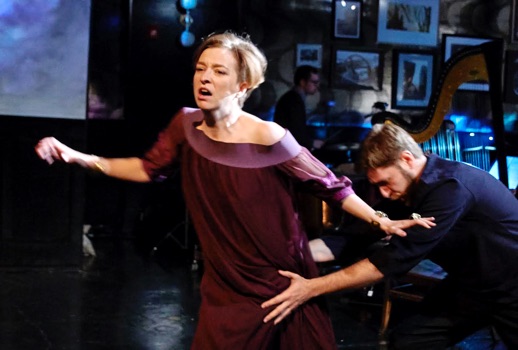

The singing is a total delight for those who like big, assured young voices tossed in their faces, the acting very strong, the staging not without puzzles, the playing of the orchestra led by Dean Buck enthusiastic but smooth. I especially liked the harpist, Stephanie Babirak, who plays the themes associated with Lucretia.
Performances are being given through the 12th of December at an elegant but curiously shaped performance space, 501 Union Street, in Boerum Hill. Be aware that if you sit on audience right of the long room, the orchestra occasionally drown some of the voices or cover their pronunciation. (There are no supertitles, I’m delighted to say.) You may also miss some of the stage action, that which takes place in a glass-enclosed alley across the room at the far left.
To compensate for this awkward shape, two videographers prowl the stage, in and out among the singers, and their video is projected onto a screen on the wall. We see Tarquinius menace Lucretia at a distance, divided from us by the invisible fourth wall, but we can also see them in close-up, his rage, her repugnance and, later, despair. Acting for such close-ups is a skill young singers must develop; LoftOpera’s company has it down.
A fine solution, that, to the space, credit for the ideas parceled out among Anshuman Bhatia, lighting and set designer, Andrea Merkx, technical director and video designer, and Paulina Jurzec, director of photography.
The stage director, Laine Rettmer, must have been in on the process too, as the swirl of images and actions is close and precise. Is it an accident that the creatives on so personal account of a woman’s rape and suicide are all women? I doubt it. But the horror of sexual predation, its bitter cost to both victim and predator, is a frequent theme in Britten’s operas.
The Rape of Lucretia, has a mixture of dramatic focus that, even more than its spiky melodies, will keep audiences puzzled and on their toes, and has kept the work from overexposure. In one scene, three men gossip about unfaithful wives, playing taunting male head games; in the next, we find three placid women, a (virtuous!) wife and two handmaids, placid at their housework. These worlds will clash, but the boundary and its violation are conveyed by a turbulent orchestral depiction of a horseback ride, enacted here, effectively, with the aid of turbulent drapery.
However, the story even this far needs background, a setting up, and to provide it, a Male Chorus (tenor) and a Female Chorus (mezzo) have explained the politics, Rome’s rule by a licentious dynasty of Etruscan kings, the Tarquins. The choruses obsess not only with Etruscans but with Christ, though (they do point out) he would not be born for another five hundred years. The entwining of these strands, pagan and political (Lucretia’s legendary violation set off the revolution that founded the Roman Republic) with Christian and redemptive dimensions, can be a barrier to audience comprehension.
But Britten, for his own reasons, chose this version, Robert Duncan’s libretto from a French play, rather than any other, Shakespeare’s poem for example, which dwells at length on Tarquinius’ lust. In the opera, Tarquinius is more envious than lustful, wanting to be loved and raging when Lucretia will not give in. The music is not sensual but jagged. Rape is an act of wrath not of lust, and a weapon against Lucretia’s husband, Collatinus, whose nobility makes Tarquinius feel small. Lucretia kills herself in despair, as the music falls into a bitter, lurching march—to the grave? Or to revolution?
To bring out the Christ symbology, which seems out of place for a story so long antecedent, Lucretia, at the conclusion of the LoftOpera staging, is anointed with sticky red liquid on her hands and ankles, and the wreath she has made of spring flowers becomes her crown of thorns. The Choruses sing of crime running in human blood, redeemed by the Crucifixion, so it works if one does not think about it much.
The use of videography to bring the drama across more immediately is brilliantly effective, but there are points in Rettmer’s direction that seem insufficiently thought out. The men’s war party should only have men in it—they behave there as they cannot in the presence of women; this is implicit in all their talk, in the careful setting up of the opera. Why insert a walk-on whore into it, who says nothing and is never addressed, only manhandled? If sexual abuse comes up at once, it will not shock us much in Act II.
Then, while the rape occurs (more or less offstage), the videocameras focus on one of the maids, shown crouching, horrified, at the door. How, then, can she sing so happily the next morning? Lucretia’s transformation should be as shocking to her maids as it is to her life. Her bruised face is another false note: Would the maids not see it, and ask about it, on so sunny a morning? They do not.
In early productions of the opera, the Choruses stood on either side of the stage and annotated the goings-on, but here they actively wandered among the participants, and their costumes like those of the other singers, were contemporary, not distanced from us in time. Rachel Dainer-Best did the costumes; I especially admired her timeless, passably archaic jewelry.
Michael Kuhn, who sang the Male Chorus, has a suave, delicious tenor, more romantic in texture than the signature Peter Pears hoot. Katy Lindhart’s near-contralto has a sensual tug that she used, with a toss of her head, to imply a cynical wink at her own moralizing. Her plush sound made a fine contrast with the similar range of Lucretia and Bianca—you couldn’t confuse any one of the three mezzos with the other two.
Kristin Gornstein, a fine actress with a deep, spacious sound, acted Lucretia touchingly and sang with earnest beauty, from the calm of her entrance to suspicion and alarm to the depths of depression. She was seconded by Toby Newman, whose agitation for Lucretia was well expressed, and by Melanie Leinbach, whose soprano sounded a bit thin in such company—but someone has to sing the high notes in the opera’s dramatic ensembles.
Kevin Wetzel an imposing figure and a purposeful actor, sang Tarquinius in a luxurious and exciting baritone, attractive and determined. He had thought the character through, and showed us the flawed and brutal thinking behind the arrogant acts, and committing them did not undermine his vocalism.
Bass Adrian Rosas made a strong Collatinus, sonorous in both moralizing to his prince and attempting to console his wife. Kyle Oliver, another fine baritone, sang the other drunken general, Junius, who unthinkingly goads the prince to dark deeds.
Every one of the cast sang Britten’s unpredictable vocal lines precisely on the note, filling the room with the physical pleasure of fine singing, the delight of size without artifice. Sean Kelly is credited with music direction; if he is to thank for the intensity and musicality of this talented, well-chosen cast, I feel very much in his debt.
Photo by Robert Altman























Comments